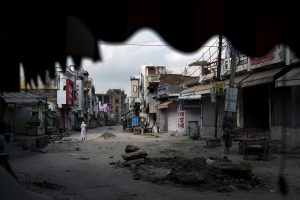Even as the violence between Meitei and Kuki ethnic groups shows no signs of abating after ravaging the northeast Indian state of Manipur for over three months, Hindu-Muslim communal violence broke out in the predominantly Muslim district of Nuh in Haryana, which borders the Indian capital of New Delhi.
The violence in Nuh began on July 31, when members of Hindutva outfits like the Bajrang Dal and Vishva Hindu Parishad — fraternal organizations of India’s ruling Bharatiya Janata Party — took the Brij Mandal Yatra (a religious procession) through a Muslim neighborhood.
Both sides were armed with bricks, rods, and guns, and before long, what began with a pelting of stones quickly escalated into deadlier violence. Rampaging mobs looted shops and homes and set vehicles and buildings ablaze. At least four people, including two security personnel, were killed that day in Nuh.
The violence quickly spilled over to neighboring Sohna, Palwal, and Gurugram districts. A young cleric was killed and a mosque set ablaze in Gurugram. A tech and commercial hub, Gurugram is barely 30 kilometers from New Delhi. Last week, communal violence was knocking on the doors of India’s capital city.
While the killing and arson by mobs in Nuh and surrounding areas have stopped, other forms of violence were set in motion soon after. Hindutva outfits are threatening Muslims to leave, and thousands have fled to New Delhi, Uttar Pradesh, and further afield to West Bengal. Over 50 panchayats (elected village councils) have issued diktats barring the entry of Muslim traders.
Meanwhile, Haryana’s BJP government began bulldozing homes and shops, mainly those of Muslims, as a form of collective punishment of the community for rioting. Over a span of five days, “1,208 buildings and other structures — overwhelmingly Muslim-owned” were demolished.
On August 7, the Haryana and Punjab High Court did some plain speaking. Describing the bulldozing drive in Nuh and Gurugram as “an exercise of ethnic cleansing being conducted by the state,” it asked whether properties of a “particular community” (read: Muslims) were targeted “under the guise of a law and order problem.” The court order served to stop the illegal and one-sided punishment.
Both Hindus and Muslims engaged in violence and suffered violence in Nuh. While it is possible that the first stone was thrown by a Muslim and the first victim was a Hindu, as in the case of almost every communal clash in India, it is the Muslims who were the biggest victims in Nuh. Moreover, what unfolded in Nuh last week, after the mobs went home, was a one-sided violent targeting of the Muslim community by the state.
Communal violence is often portrayed as spontaneous and as a sudden outburst of community anger. However, communal violence in India is usually planned and orchestrated by vested interests. This was the case in Nuh. It did not appear out of the blue.
Since 2014, when the BJP came to power and pursued its Hindutva agenda, cow vigilantism has grown across India. In the name of protecting cows, which a section of Hindus revere, hundreds of Muslims have been lynched to death by these cow vigilante groups. Several of the victims were accused of transporting cows for sale as beef.
Haryana has three main cow vigilante outfits: Goraksha Dal, the Goputra Sena and the Bajrang Dal. An estimated 20,000 youth are said to be affiliated with these groups, which have spread terror among the Muslim community in Haryana.
Nuh’s Muslims, who engage in the dairy business and rear cattle, have been targeted over the past decade by the cow vigilantes and several members of the community have been lynched. Fear and anger have been growing among its youth.
Since 2021, the Vishva Hindu Parishad has organized the Brij Mandal Yatra in Nuh. This year’s procession was on a larger scale; Hindus and Hindutva activists from other states were mobilized to participate in the procession. Moreover, among those who were touted to participate in the event was Monu Manesar, a notorious cow vigilante who is wanted for murdering Muslims but reportedly enjoys police protection.
In the run-up to the procession, videos and posts on social media were rife with threats. “Monu Manesar is coming,” said one video. Triggered by his likely participation in a public event, Muslim youth hit back with their own videos, demanding Manesar’s arrest and warning of “consequences.” Muslims were mobilized from surrounding areas.
The stage was set for the Hindu-Muslim clashes at Nuh.
Following the violence, Haryana Home Minister Anil Vij said: “Bullets were fired from hills, stones were collected on roofs, and fronts were set up. It was planned by someone and we are investigating.” He was pointing an accusing finger at the Muslim community.
Certainly, the violence that broke out on July 31 was preplanned – but by both communities. Both sides mobilized, and came armed and ready for violent confrontation.
That the state was complicit in this violence is hard to ignore.
There are serious questions that the Haryana government needs to answer. Why did it permit the Hindu procession to go through Muslim areas at a time of rising tensions between the two communities? Why did the police not detain those posting incendiary videos? Why were those flaunting weapons and shouting provocative slogans during the procession not arrested? Importantly, will the government answer the High Court’s question relating to ethnic cleansing?
The BJP and its fraternal organizations have used communal violence for electoral dividends. With elections nearing, more incidents like the violence in Nuh can be expected.

































